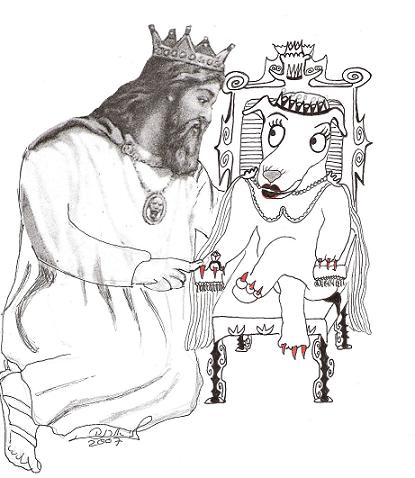
The sages claimed that Koresh, king of Persia, the king who allowed to Jews to return to Zion, started out righteous and towards the end of his life became licentious and evil. The scholars investigated the source of the sage’s claim that Koresh became evil. One of the sages, Rav Yossef, explained: It is written in Nehemiah (2:6) “And the king said to me, with his shegal sitting next to him.” (The king referred to in this verse is Artaxerxes, but according to the sages the kings Artaxerxes, Darius, and Koresh were all the same person, using three different names.) And who was the consort who sat at his side? A canine who was set aside for sexual intercourse. This shows us that Koresh became licentious and evil. The scholars asked: if the term shegal is identified with canines, how do we interpret the verse in Daniel 5:23, “And your shegal drink wine”? Do canines customarily drink wine? Yes, the scholars answered, a canine can be trained to drink wine. The scholars continued to inquire into the link of the term shegal with canines. How can we interpret the verse in Psalms which praises the righteous and wishes them a propitious future, “To your right the shegal did stand” (Psalms 45:10). What is so good about having a canine stand to the right of the righteous?
Answer: The verse can be so interpreted, because the Torah is as dear to the righteous as canines used for sex are to the gentile; they represent a propitious future. The scholars gave another answer: the word shegal in the Torah can be interpreted as “consort,” and this would remove all previous questions. Only in the verse dealing with Koresh is the shegal a canine, for this is what the sage handed down. Why did the verse call Koresh’s canine a consort? Because she was as dear to Koresh as any consort. Another possibility is that Koresh placed his beloved canine upon a queenly throne.
(Babylonian Talmud, Tractate Rosh Hashanah 4a)
